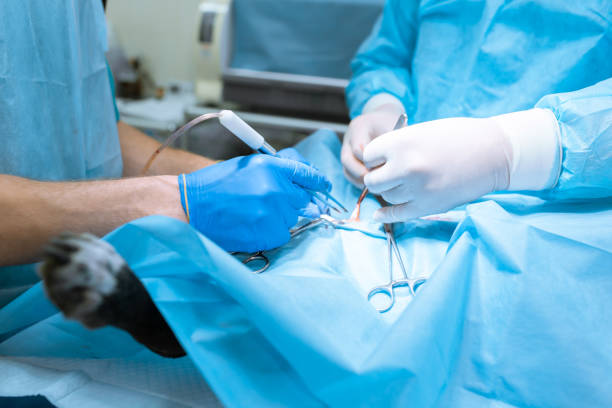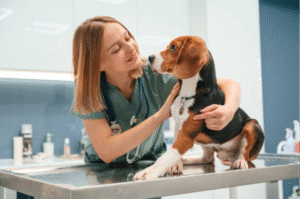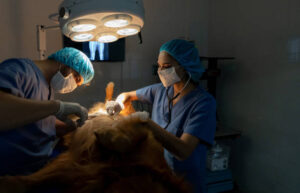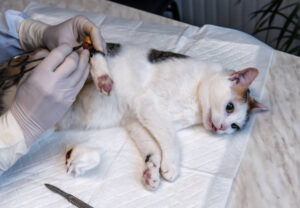For many pet owners, making choices about their pet’s health and behavior can be overwhelming. One of the most impactful decisions you can make is whether to spay or neuter your cat or dog. AtHappy Tails Animal Hospital, we believe that educating pet parents is just as important as the procedures we perform. Spaying or neutering is not just about preventing litters—it’s a decision that supports your pet’s longevity, improves their behavior, and promotes a healthier animal community in Renton and beyond.
What Are Spay and Neuter Procedures?
Spay and neuter procedures are surgical methods used to sterilize pets, preventing them from reproducing. Spaying involves removing a female animal’s ovaries and uterus, while neutering involves removing a male animal’s testicles. These procedures help control pet overpopulation and can also reduce certain health risks and unwanted behaviors. They are typically performed by veterinarians under anesthesia.
Definitions and Differences
Spaying (ovariohysterectomy) and neutering (castration) are surgical sterilization methods performed on pets to prevent them from reproducing. Spaying involves the removal of the ovaries and uterus in female animals, while neutering involves the removal of the testicles in male animals. Both are performed under general anesthesia by licensed veterinarians and are considered low-risk, high-benefit procedures.
Why Are These Procedures Recommended?
Veterinarians recommend spaying and neutering for several compelling reasons. These procedures help control pet overpopulation, reduce the risk of certain cancers and infections, eliminate undesirable reproductive behaviors, and lead to calmer, more predictable pets. Most importantly, they contribute to the welfare of animals on a broader scale, reducing the number of homeless pets and the burden on shelters.
Benefits of Spaying and Neutering Your Pet
Health and Behavioral Advantages
Spaying a female pet before her first heat cycle reduces the risk of uterine infections and mammary tumors, which are often malignant in cats and dogs. Neutering male pets eliminates the risk of testicular cancer and can significantly reduce the risk of prostate problems. These procedures also reduce hormone-driven behaviors like excessive barking, marking, aggression, and roaming in search of a mate. Spayed females don’t go into heat, which eliminates the risk of bloody discharge, restlessness, or yowling that can occur multiple times a year.
Community and Population Control
Every year, millions of unwanted animals are euthanized in shelters due to overpopulation. By having your pet sterilized, you help reduce the number of unwanted litters and lower the demand for limited shelter resources. Responsible pet ownership, including spaying or neutering, is a cornerstone of solving the animal homelessness crisis. In Renton, communities benefit from reduced numbers of strays, fewer animal-related incidents, and improved public health.
When Is the Right Time to Spay or Neuter?
The ideal time to spay or neuter your pet depends on their age, breed, and overall health. Most veterinarians recommend spaying or neutering cats and small dogs around 5-6 months of age. Larger dog breeds may benefit from waiting until they are 12-18 months old to allow for proper growth and joint development. Always consult your veterinarian for personalized advice.
Age Guidelines by Pet Type
The optimal age to spay or neuter a pet varies based on species, size, and breed. For cats, spaying or neutering is generally recommended around 5–6 months of age. For small to medium-sized dogs, 6–9 months is typical. Larger dog breeds may benefit from waiting until they are 12–18 months old, especially if orthopedic development is a concern. These decisions are best made in consultation with a veterinarian.
Special Considerations for Breed or Health
Some breeds—especially large dogs like Labrador Retrievers, Rottweilers, or Great Danes—may experience skeletal or joint issues if neutered too early. Pets with chronic health conditions may need different timing or preparatory care. At Happy Tails Animal Hospital, our team evaluates every pet’s age, breed, behavior, and health history to recommend the safest and most effective time for surgery.
The Spay and Neuter Process Explained
The spay and neuter process involves surgically removing a pet’s reproductive organs to prevent unwanted litters. Spaying is performed on female animals, removing the ovaries and uterus, while neutering involves removing the testicles of male animals. The procedure is safe, typically done under anesthesia, and offers health benefits like reducing the risk of certain cancers. It also helps control pet overpopulation and can improve behavior.
Pre-Surgical Preparation
Preparation for surgery begins at home. Most pets must fast for 8–12 hours before surgery. Pre-operative bloodwork may be required to check for any underlying health concerns. Your pet’s vaccinations must be current, and your vet may recommend flea or parasite control before surgery. Your vet will also go over the expected timeline and answer any questions you may have before the big day.
What Happens During Surgery?
The procedure begins with general anesthesia. Your pet’s vital signs are closely monitored throughout the surgery to ensure safety. The surgical site is shaved and disinfected. In females, an incision is made in the abdomen to remove the reproductive organs. In males, a small incision is made near the scrotum to remove the testicles. The surgery generally lasts 30 to 60 minutes. Afterward, your pet is monitored in a recovery area until they’re awake and stable.
Post-Operative Care and Recovery Tips
Proper aftercare ensures your pet recovers quickly and without complications:
- Keep your pet calm and restrict activity for at least 7–14 days
- Monitor the incision daily for swelling, redness, or discharge
- Prevent licking or chewing using a recovery cone
- Administer pain medications as prescribed
- Avoid bathing your pet until your veterinarian clears it
If any unusual symptoms occur—such as vomiting, severe swelling, or lethargy—call your veterinarian immediately. Happy Tails offers follow-up support and rechecks to ensure everything heals correctly.
Myths and Misconceptions About Spaying/Neutering
Many people mistakenly believe that spaying or neutering will make pets lazy or overweight, but proper diet and exercise prevent this. Some think pets should have at least one litter, though this has no health benefits. Others fear it changes a pet’s personality, yet it often reduces aggression and roaming. Overall, spaying/neutering promotes healthier, happier pets and helps control overpopulation.
Common Concerns Debunked
Many pet owners avoid spaying or neutering because of persistent myths. One common belief is that sterilized pets become lazy or overweight. In reality, diet and exercise, not surgery, are the main factors affecting weight. Another myth is that pets need to have one litter before spaying, but this offers no health advantage and may increase medical risks. Others fear personality changes, but pets retain their individual temperament. What you may notice is a reduction in hormonally driven behaviors like aggression or anxiety.
Professional Veterinary Insights
Our veterinary team emphasizes that spaying and neutering is not a one-size-fits-all procedure. Each animal’s needs are considered individually. Whether it’s choosing the right age for a large-breed puppy or tailoring recovery recommendations for a senior cat, Happy Tails Animal Hospital provides the personalized care needed to achieve the best outcome.
Choosing the Right Veterinary Clinic in Renton
When choosing the right veterinary clinic in Renton, look for experienced veterinarians and a wide range of services, from wellness exams to emergency care. Check online reviews and ask for recommendations from local pet owners. A clean facility, friendly staff, and clear communication are key signs of quality care. Always visit beforehand to ensure the clinic feels welcoming and professional.
What to Look for in Spay/Neuter Services
Choosing the right clinic ensures your pet receives the best care. Look for clinics that offer:
- Experienced, licensed veterinarians
- Clean, well-equipped surgical suites
- Clear communication and informed consent
- Transparent pricing with no surprise fees
- Supportive aftercare and follow-up services
Why Happy Tails Animal Hospital is a Trusted Choice
At Happy Tails Animal Hospital, we’ve helped thousands of Renton pets safely undergo spay and neuter surgeries. Ourspay and neuter services include thorough pre-operative exams, professional anesthesia protocols, experienced surgical teams, and compassionate post-op guidance. We educate pet parents at every step so they feel confident and informed throughout the process.
Quick Comparison Table: Spaying vs. Neutering
| Feature | Spaying (Female) | Neutering (Male) |
| Surgical procedure | Ovary and uterus removal | Testicle removal |
| Average age for surgery | 5–9 months | 6–12 months |
| Recovery time | 10–14 days | 7–10 days |
| Common behavior changes | Stops heat cycles | Reduces marking & aggression |
| Health benefits | Prevents uterine & breast tumors | Prevents testicular cancer |
| Cost estimate (Renton) | $300–$500 | $200–$400 |
Conclusion
Spaying or neutering is one of the most compassionate and practical choices you can make for your pet. It improves health, supports better behavior, and contributes to the overall well-being of your local pet community. Choosing when and where to have the procedure done is just as important as deciding to do it. At Happy Tails Animal Hospital, our dedicated team is ready to guide you through every step, from pre-surgical planning to aftercare support. If you’re looking for safe, expertspay and neuter services in Renton, we’re here to help your pet live a longer, healthier life.
Frequently Asked Questions
Q. At what age should I spay or neuter my pet?
A. Typically, between 5 to 9 months, depending on species, breed, and health status.
Q. Will sterilization affect my pet’s personality?
A. No. Your pet’s core temperament will remain the same. Only hormone-driven behaviors may change.
Q. Is the recovery process painful?
A. Most pets recover comfortably with the help of prescribed pain medications and rest.
Q. Does spaying/neutering prevent cancer?
A. Yes. It significantly reduces the risk of reproductive cancers and infections.
Q. Can I afford the procedure in Renton?
A. Happy Tails Animal Hospital offers competitive pricing and comprehensive care to ensure value and safety.





